November 27, 2019 – Thinking of studying at Zagreb University and wondering what you need to know? Our next task for our intrepid interns is a joint project to come up with their ten top tips for noobs.
Hi there, Future Student at the University of Zagreb! If you are worrying about studying in the Croatian capital, you are in the right place. We, Paula, Ana, and Janja, have highlighted ten things we wish we had known before we started our university life in Zagreb. We sincerely hope this article will help you and make your student life more comfortable in the new city. Let’s begin!
Financial plan
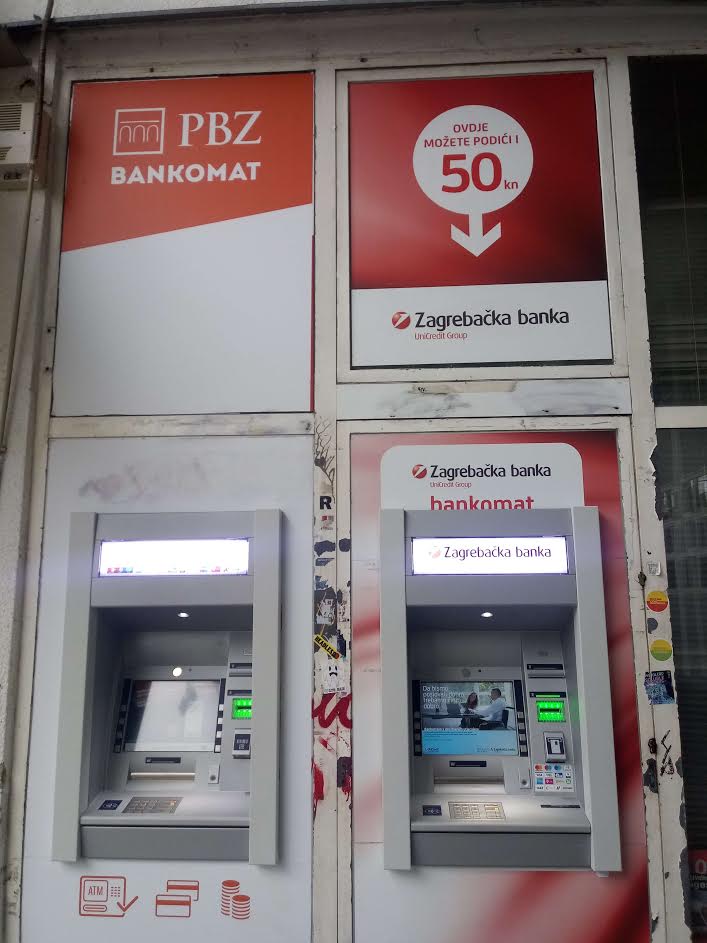
ATM around Student centar (special for students, you can withdraw a HRK 50), credit: Janja Šestak
When you live with your family, you don’t bother that much about money, right? Well, when you go to college, it’s a bit different. You get money from the parents, grandparents, aunts, and uncles. You have your own money, but you are also in charge of spending the money. That might sound fun at first, but not everything is as easy as it sounds. Firstly, our warm recommendation is to make a financial plan for the whole month. Housing, food, clothes, coffees, parties, and the most important, of course, literature for college ;), all of this requires a certain amount of money. Pay attention to how much money you spend, and is there really a need to eat at McDonald’s or fancy restaurants so often. When you buy food, make sure you rather spend money on quality products and buy on discount if possible.
If your grandparents ever forget to send you the money, you can apply for a scholarship. Each year, the Ministry of Science and Education awards three types of state scholarships to full-time college students: state scholarships to students in STEM fields of science (1200kn), state scholarships to students based on socioeconomic status (1200kn), and scholarships to students with special needs (1200kn).
More information can be found on their website.
Also, some faculties have their own scholarship, which they use to encourage their students to study harder. Don’t forget to thoroughly research the faculty you are applying to. Another thing to keep your eye on is the Scholarship and Higher Education Fair, which is held every year in October in three Croatian cities: Zagreb, Zadar, and Rijeka.
Housing: apartment, family, or student dorm?
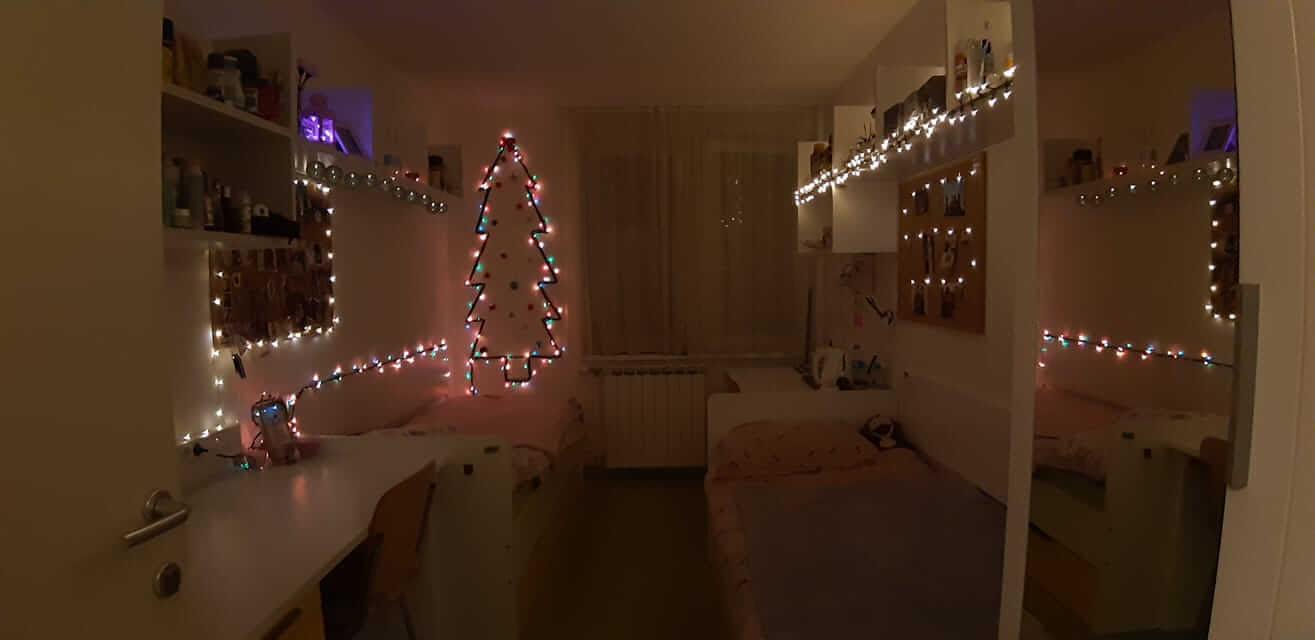
Christmas room in a dorm, credit: Petra Lončar
There are different types of accommodation for you in Zagreb. The first one is pretty simple. If you are from Zagreb, you are probably going to remain in your family home. The second option is taking the matter into your own hands and finding an apartment. With it comes all the responsibilities of cleaning and cooking by yourself. The last and most common one for anyone coming to Zagreb is living in student dorms.
All three of us have different experiences regarding housing. Paula is from Zagreb, so she lives with her family, Ana is from Šibenik and lives in the flat and Janja, also not a student from Zagreb, used to live in a student dorm.
Janja lived in student dorm Stjepan Radić, popularly called the Sava, and her experience was a surprisingly pleasant one. She was in a renovated 7th pavilion on the first floor. One of the most important things about living in a dorm is your roommate. If you get a normal one, you’re lucky. So, if there’s a chance, try to meet your potential roommate before you two move in. Secondly, Sava is the biggest dorm of all, and it has around 4000 beds. In the dorm complex, there is a fitness center, a cinema hall, classrooms, a foreign language school, a medical and dental office, a dance hall, two student food restaurants, and a pizzeria, as well as a cafe popularly called “Slasta.” You can find all the other information on the website that we linked to above.
There are a few other things to know which you will not find on the website. If you’re a quieter person, we recommend pavilions 7th to the 9th. But if you are more of a party-animal, book pavillions 1-4 because they are closest to the famous night clubs, Roko and Žabac.
The unwritten rule is that students greet each other in the hallways of the dormitory, hold the door open, and have respect for others. You might be wondering right now about the last thing. Let me put it in this way: You just passed the last exam and want to celebrate it with your friends. You invite the people in your room, put the music on, and after half an hour, you hear knocking on the door. You open the door, and there are security guards who say that someone has reported you because of the loud music. They will kindly ask you to turn the music down. What we are trying to say is that there is no problem in celebrating. The problem is in people who might not be the kindest if you party in the middle of exams season. If you want respect from your co-habitants, you have to act the same way towards them as well. Don’t call the security guards as soon as you hear music from the room across you. Instead, come to the room where the LOUD music comes from and kindly ask them to turn it down a bit. If they are rude to you, feel free to call the security guards, and they will solve the problem.
People often say that the Sava has soul. And you know what? It truly has. It’s wonderful when, in the evening, there are a bunch of young people sitting on the benches, some of them playing the guitar, others just talking with each other… The Sava is a mini-city for students and the best you can get if you are here both for studying and fun.
Apart from the Sava, there are Student dorm Ante Starčević (known to most of the students as Šara), Student dorm Lašćina and Student dorm Cvjetno naselje.
Even though we don’t have the first-hand experience with any of the other dorms, we can assure you they don’t have significant differences. The only thing is that the Sava is the biggest Student dorm. The Sava also has its Facebook group, where students help each other with all the necessary information. In that group, students make jokes, ask each other where they can buy cheap food, and inform each other about security and payment issues. Also, there will always be information about upcoming events in clubs and other exciting events in Zagreb.
Life with your parents has its ups and downs as well. While your colleagues have a hard time figuring adult tasks such as doing the laundry or cooking and have just now realized how extremely grateful are they for their moms at home, some of you might wonder what the best way to “survive” living with your parents for the next five or more years is. While some of you think everything is magically going to change as soon as you enroll in college or live in an illusion that your parents will be more understanding of you since you are a college student now, forget it. Most of you will have the same relationship with your parents you use to have while you were in high school. That is why a significant number of people go on Erasmus exchange or try living on their own by the end of college. While living with your parents might sound like a hard time, try asking some of your friends who live on their own or in student dorms how much more they appreciate their parents.
Living in a flat is a whole other story. When you live in a flat, make sure you know the person that lives with you very well. We recommend you know the person because figuring out a financial plan and agreeing on who does the house chores might be hard with someone you don’t know that well and aren’t used to. When you are looking for a flat, make sure you find the location from which you have the least to commute to your college. Furthermore, search for places where tram, bus stations, and stores are nearby. Also, make sure your landlord is not strict and that they don’t request frequent inspections. Make sure your flat has all the necessary equipment such as washing machine, TV (if you watch it), Internet, central heating, etc.
Living on your own is great because you have your own space and you don’t have to depend on the cafeteria for your meals. If you are a good cook or don’t feel like eating the same thing every day, this is the ideal time to perfect your cooking. Besides, you are not as restricted as your colleagues in a student dorm and can bring friends to your apartment if you wish to. But bear in mind when your friends come and the party starts, you might find that you have neighbors sensitive to loud music here as well.
Traffic in Zagreb
One of the most frequently asked questions almost every student who is not from Zagreb asks probably for the first month or so is, “In which direction I am supposed to go?”
This sweet problem is part of Zagreb’s public transport, which includes trams, and buses owned by a company called ZET (Zagreb electric tram). The monthly student pass is HRK 100, while the annual is HRK 960. If you choose the monthly option, remember to renew it on the 1st of every month. Otherwise, you can be charged up to HRK 800. There is a valid reason why ZET’s official motto is – A ride without a ticket/pass – The most expensive ride. You can renew your pass at kiosks or in ZET offices.
Essential information for students who like to party in many of Zagreb’s famous clubs or are going home from a friend because they studied till 3 a.m. – be aware there won’t be a tram every 7 minutes. There is a big difference between daily and night tram transport. In the 21st century, with the help of Google Maps, there shouldn’t be a problem to get somewhere, right?
This is a screenshot of a network of nightly tram lines that run on average every hour.
Get informed, don’t be shy!
We all know what it is like to be a lost student in the faculty building, searching for the right lecture hall. The most important thing is to relax. You can always ask a doorman or some person who seems approachable. Don’t be shy! There are always older students who are willing to help you. Try to find Facebook groups and join them. You will find a bunch of useful information. If you don’t find the answer to the thing you are searching for, ask politely, someone will answer it. If you can help others, this is also great. You will get to know many people through conversations such as “Where is the next lecture?” and remember, some of them might become your friends.
One important thing about having a lot of friends in the first year is that you have to be aware that some friendships won’t last. Don’t take it as something bad; be natural, and real friends will eventually come around.
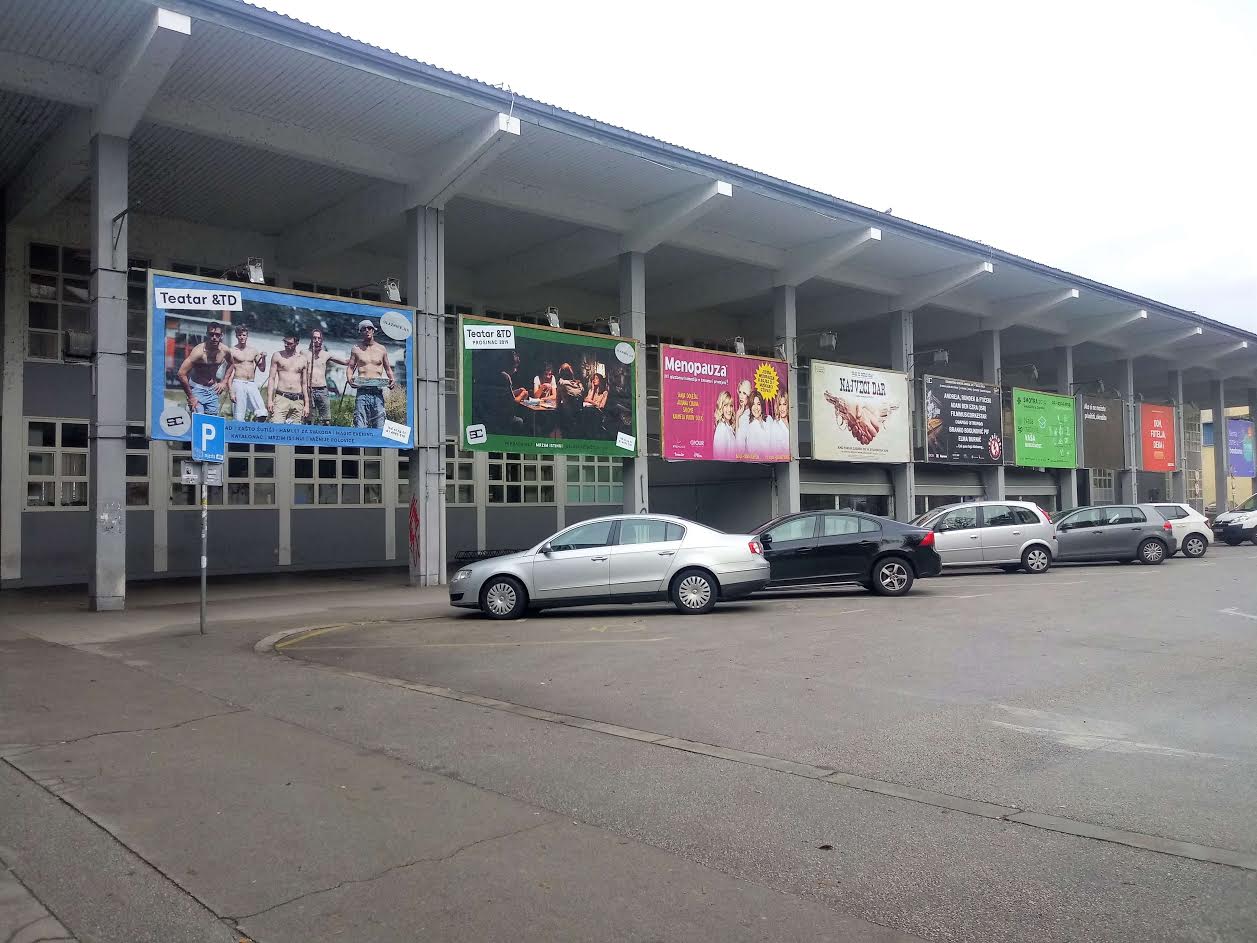
Posters in the front of the SC, (recognition of the SC), credit: Janja Šestak
If you want to do some extra job, volunteer, or you already want to start working in the field in which you are studying. Maybe it would be better for you to leave it for next year or at least the next semester. College is not a high school. There are numerous new things that you have to get used to. You might have moved from your parents, you are meeting a lot of new people. Give yourself some time and only then include work and/or volunteering.
Lectures and how to survive them
You have to be aware that some lectures won’t be that interesting. Our sincere advice is, no matter how boring the lecture is, be there. The first week is one of the most important weeks, and it’s often called orientation week. That means professors say the most important things every student needs to know – dates of midterms, which literature you have to have, where to find a syllabus, how many absences you can have (!), and whether the lectures and seminars must be attended. We recommend you pay attention to how many times you were absent because if it’s more than the professor says, you won’t get his signature in the Index. That means you can’t pass that lecture. It is a pretty big deal, so don’t play with that.
On some faculties, you can pass the course without taking the exam in exam season (February, June, or September), but rather be done with it earlier and pass it through the midterms. Then again, don’t be upset if you don’t pass the midterms and have to take an exam, which includes a whole semester to learn. It’s not the end of the world. You will just need to organize better in order to learn everything!
Literature and how to spend the least amount of money on it

Interliber, credit: zv.hr (Official page of Zagrebački Velesajam)
One of the most significant differences between High School and college is definitely the amount of books you will read (or will you?) during the course of your higher education. Most of the classes will have their mandatory literature, and without reading it, it is highly unlikely you will pass the exam. The problem is that most of these books can be pretty expensive, especially for students. But there is a solution to the problem – INTERLIBER.
Interliber is a book fair that lasts for a week, every year, during November (great if your exams start in late November, early December), which offers a wide variety of books for cheaper prices. You can either find books for leisure reading for rather symbolical prices of 5 to 10 kunas or stumble upon a significant discount for your mandatory literature.
If you are one of the lucky ones, and your college doesn’t oblige you to buy all of your literature books, but you still need to find the books somewhere, Zagreb City Libraries (Knjižnice grada Zagreba –http://www.kgz.hr/en/about-us/zagreb-city-libraries-today/523) or National and University Library Zagreb (Nacionalna i sveučilišna knjižnica – http://www.nsk.hr/en/) are the most important places you can go to. Both of them require you to pay for membership fees and in return, offer a broad range of books that can be related to your subject of study. If you feel overwhelmed already, both of the libraries have a catalog of all of their books on their website, and you can even check if the books you need are available.
Zagreb City Libraries are not as student-oriented as the National and University Library. There are 42 City Libraries located throughout Zagreb, many of them in the city center. However, there are some in the neighborhoods not so close to the center. If we had to single out the best library in the city center, it would be Bogdan Ogrizović Library near Cvjetno square, which has the biggest collection of books in English. The annual fee for ZCL is HRK 50, and with it, you can borrow books from all ZCLs. Working hours for ZCL are from 8 a.m. to 8 p.m., so you have plenty of time to borrow books and study there throughout the day.
If you are the type of person who can study while being surrounded by other people who study, the National and University Library is the place for you. It is located in Hrvatske Bratske Zajednice street number 4, next to Zagreb fountains, and it is the perfect building, which is both the place to borow books and study if you can’t find peace anywhere else. The annual fee for NUL is HRK 100, but you can be sure to find all the mandatory literature in one place.
Student jobs
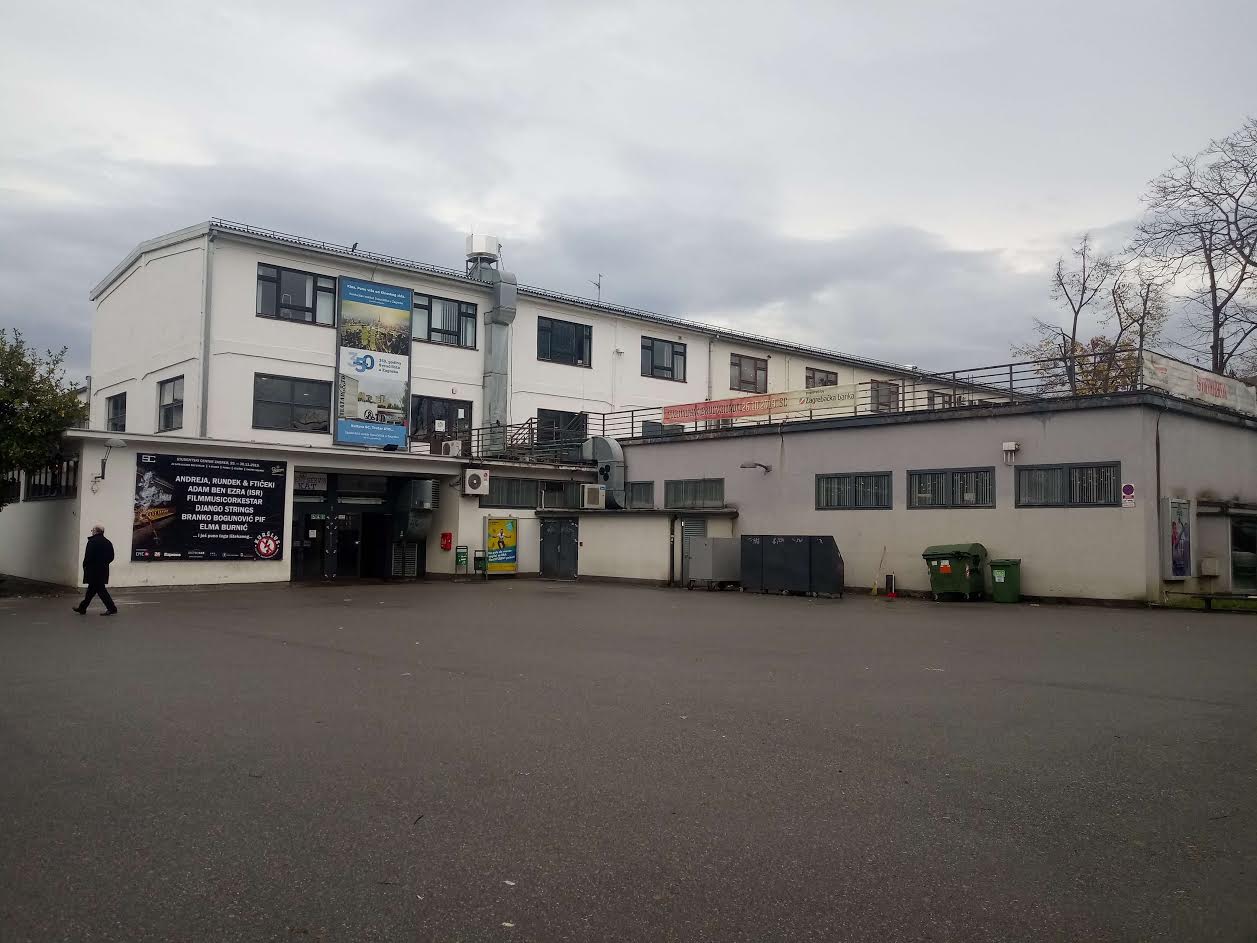
The building of Studentski Centar, credit: Janja Šestak
More than 60% of students in Croatia work through the Student service. Most of them only get the chance to work during the summer break, but those of you lucky enough to have some free time left after your lectures might be able to work throughout the year.
There are many great reasons why you should get a job. For starters, having some pocket money on the side can be a great help to your parents and a first step in becoming economically independent. Trust us, your parents will be extremely grateful if they don’t have to pay for everything you do in your free time.
If you decide to get a job, the first thing you need to know is to create a student contract in the student service (Savska 25), one floor above the student cafeteria. Prepare yourself for gathering a lot of official papers and waiting in a line, but after that, you can be sure you will get a job you will be paid for regularly and fairly.
What you’ll need to enroll in Student service are following official papers:
1) college confirmation that you are a full-time student (can be electronic record as well)
2) identity card (ID) – osobna in Croatia – it is necessary to prove your identity
3) IBAN personal giro account – a bank card or a contract with a bank, that way Student service can be sure money will come to your account and not someone’ else
4) OIB number – same as ID, only for confirmation of your identity
5) 35×25 mm format photo
6) X-card (X-ica) – confirmation document for all students –
- • recent high-school graduate students can present Indeks if they haven’t received their X-card as well as a certificate that shows they have finished the final year of high-school and printout of the application for state matura examination or a certificate of the state matura examination
Student service is for full-time students and high-school graduate students who have finished their matura exam and want to work during the summer before their college starts.
If you’ve fulfilled all the above instructions, you can start looking for a job. Your best chance lies in sending an e-mail of application and your CV on one of the numerous job applications you will see on the Student service page. Remember not to be disappointed if your first application doesn’t result in you getting a job right away. Don’t be afraid to send an e-mail and CV to multiple addresses.
After you have found the job and got through the interview, you should watch out for these things as well:
1) as of January 1st, 2020 your minimum hourly wage should be 25,38 kunas
2) students that work don’t have usual health insurance that full-time employers have, so make sure you check on the Croatian Health Insurance Fund pages (HZZO) what kind of insurance if any, you have
3) watch out for night shifts, working on Sunday and during state or religious holidays
- a) night shifts are counted from 10 p.m. and your hourly wage should be 30% bigger than on the regular workday
- b) on Sunday, your hourly wage should be between 30 and 50% more than on the regular workday
- c) your hourly wage for state and religious holidays should be at least 50% bigger than on a regular workday
4) a minimum of one day off per week is mandatory
5) when it comes to working multiple shifts, remember that there needs to be at least 12 hours break between two shifts
Unfortunately, student work isn’t regulated by strict law. That means that some people like to take advantage of students by making them work multiple shifts in a row, not paying them enough, etc. This problem can be easily solved by educating students about their rights and finding out who you’ll be working for, how much you’ll work, and in what conditions.
X-card (x-ica)
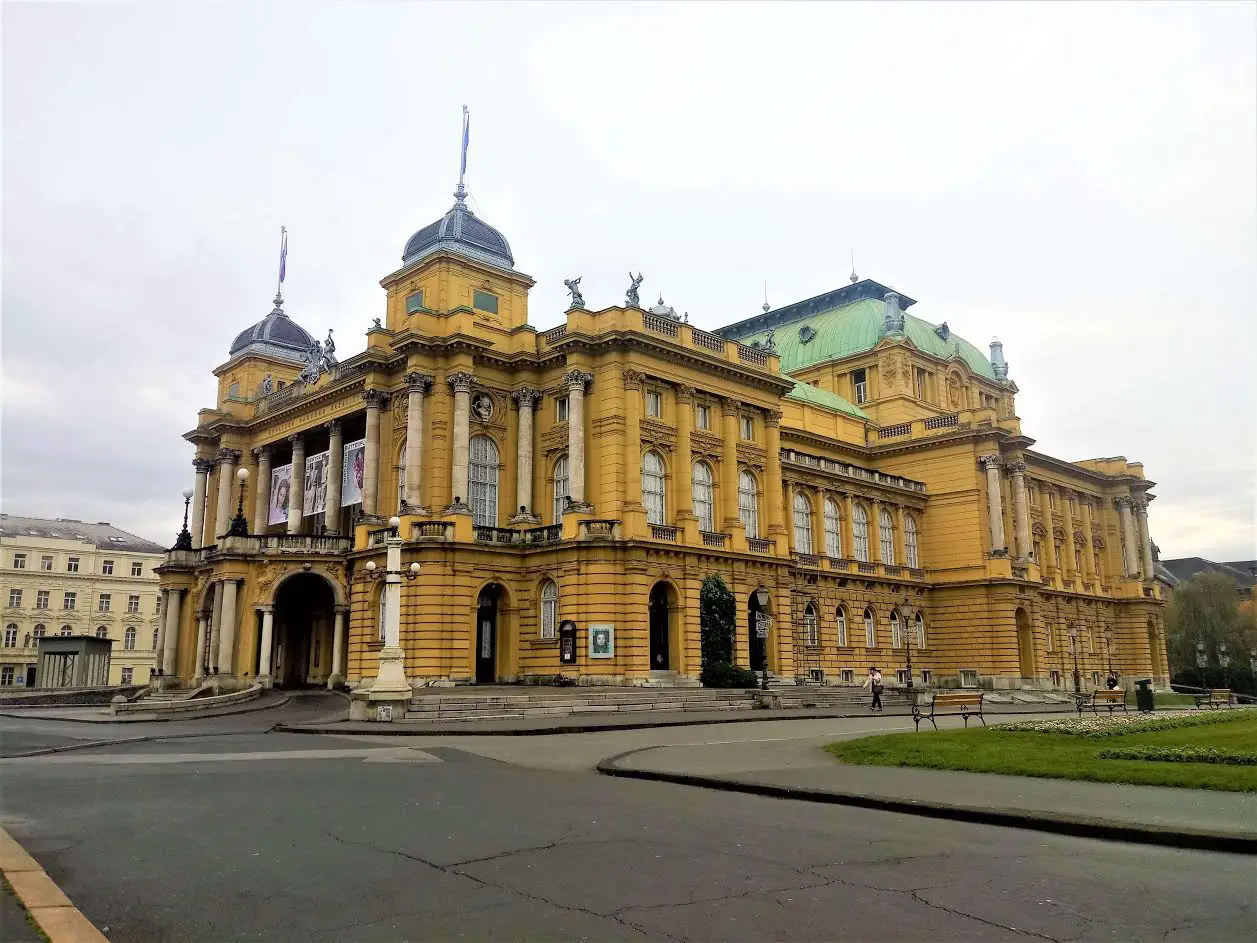
HNK, the Croatian National Theathre – credit: Janja Šestak
In addition to cheaper food in the cafeteria, X-card can also give you other advantages and make your student life a bit more than studying and attending lectures. You can get a discount if you buy student passes for trams and buses. Also, there are discounts for students traveling home, and all of that can be achieved if you show your X-card.
If you are a fan of sports or just want to keep your body in shape during your college days, you can get a discount with X-card in various gyms and sports clubs. The Sava student dorm has a gym, which you can use an unlimited amount of time for only 100 kunas per month. Other offers include Zumba and aerobics, both of which you can practice two times a week, also for 100 kunas. In Cvjetno Naselje, unlimited fitness gym is 125kn, Zumba two times a week is 100kn, Aerobics three times a week is 125kn.
If you are passionate about movies and enjoying going to the cinema, but you think CineStar is a bit expensive, don’t worry. You can get a discount there as well. You will pay 23 kunas for movies that last 120 minutes, and 25 kunas for movies that last 120 minutes and more. In addition, every Wednesday, all the tickets are 20 kunas.
More information can be found on the link.
If you are a fan of theatre, there is something for you as well. With your X-card, you can watch a show at Kerempuh for 45 kunas. The Gavella, one of the Zagreb’s most famous theatres, has a special card for pupils, students, pensioners, and for people with disabilities. The price for the card is 35 kunas as well as ticket price. Theatre Komedija enables students a 20 percent discount for one ticket if you show your X-card.
Explore Zagreb
When you get tired of studying and want to relax with your friends and drink for affordable prices, you might want to check Žirafa. It is one of the most visited places if you are a student in Zagreb, and is located in four locations: Jurišićeva 19/, Maksimirska cesta 64, Gunudlićeva 11, and Ilica 70. The other clubs in Zagreb for students are Club Roko (Jarunska 5), Žabac (Jarunska 1), and Klub klub (Pavla Haltza 14).
From the beginning of December till late January, Zagreb becomes the most beautifully decorated city in Europe. It even won the award for it three years in a row.
King Tomislav Square has a big ice rink, and there are many stands all over the city which sell mulled wine, sausages, or if you like something sweeter, fritters (fritule), germknödeln, and many more delicates from all over Croatia. The main square (Ban Jelačić Square) is also famous for its many concerts during the winter period. Park Zrinjevac is very beautiful when the snow comes, and there are great concerts of traditional Christmas songs there as well.
Klovičevi dvori are famous for being the most photographed place during the advent. From the back entrance to the Klovičevi dvori, there is a breathtaking platform that offers a view of Zagreb Cathedral. Free concerts are also held there. For more information about advent, take a look at their page https://www.adventzagreb.hr/.
If you are into sports, Jarun is an excellent place for you. It has a track for running, skating, riding a bike, or taking a walk with your friends. Jarun is very close to Studentski dom Stjepan Radić. During the summer, precisely in June, Jarun is the home for the Inmusic festival. Bundek is also a lovely place for sports activities, as well as concerts. In September they have an event which is called Rujanfest, the prices are not expensive.
If you love skiing and hiking, Sljeme is an excellent place for you. Medvednica, a hill under which Zagreb lies, is a popular weekend getaway for the people from Zagreb and can be an alternative offered on some Faculties as a way of completing your physical training course (PE).
Makismir forest is a fantastic alternative for everyone who lives on the east side of the city. In the middle of the park, there is a Zagreb ZOO. Nearby there is a stadium where the football matches are held.
Zagreb is renowned for its many museums. Probably the most famous is the Museum of Broken Relationships (Muzej prekinutih veza), where people from all over the world leave relics and symbols of their failed relationships. Other museums include, the modern Museum of Illusions and The Museum of Torture.
Student organizations
Again, for those of you who have free time and want to develop some additional skills to be more competitive in the job market, student organizations are the best option. While volunteering in organizations might sound silly to the students in the STEM department, it can mean the world to the students studying social sciences.
Zagreb is an excellent city and headquarters for many different organizations, so there is something for everyone. Some of the organizations are Studentski.hr, Srednja.hr, Financijski klub, Hrvatska studentska organizacija, Svjetski savez mladih Hrvatska, Erasmus studentska mreža, and many more. If we had to highlight some of them, AIESEC and eSTUDENT would definitely get our vote.
AIESEC is the oldest student organization in the world, it was established in 1948 as a response to all the violence that the world has seen and as a way of connecting students all over the globe. Their primary mission is changing the world and bringing peace to everyone by changing one person after another. Today AIESEC works in more than 120 countries in the world, it has over 40 000 members, and it mainly focuses on its volunteering and working internships. In addition, they strive to create leadership skills in young people (all of their members being between18 and 30 years old) and creating a better tomorrow.
eSTUDENT is a Croatian based non-profit organization that was founded in 2004 through an initiative of proactive students who wanted to make a difference and gain practical knowledge experience. From the beginning, it was led by people who strived for more, and their goal hasn’t changed until today. They still aim to provide students with additional education which they might not found at their colleges and through working on projects and creating a firm atmosphere which would significantly improve students in their future jobs.
Both of these organizations give a fantastic asset to your CV and might make a difference when it comes to job offers. You will be much appreciated and awarded for all the hard work and for doing something out of your free time.
Check out how it was on Radićevi dani (Radić’s days) in the video above, and don’t be afraid to admit the Sava already gained a place in your heart!
- written by Janja Šestak, Ana Samodol and Paula Anić
To learn more about the Croatian capital, check out the Total Croatia Zagreb in a Page guide.










